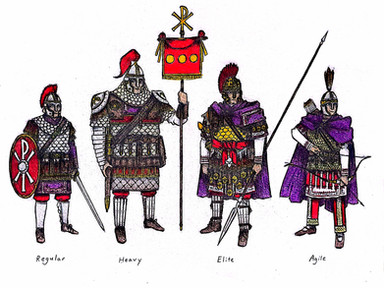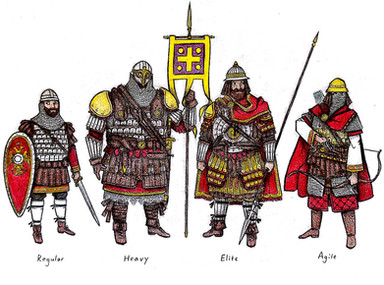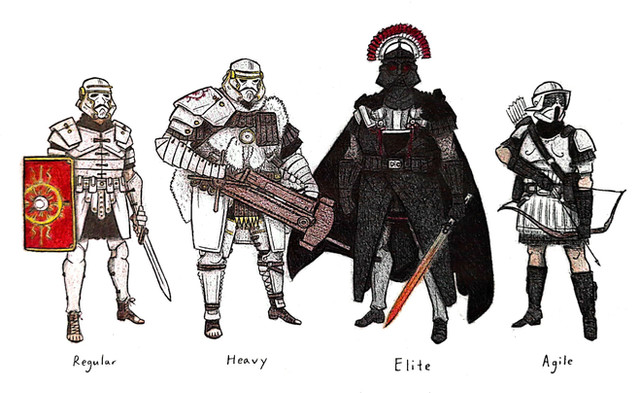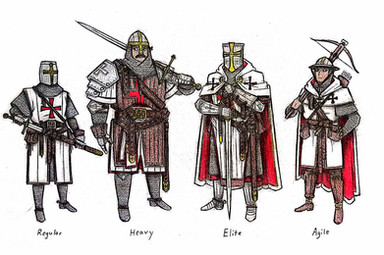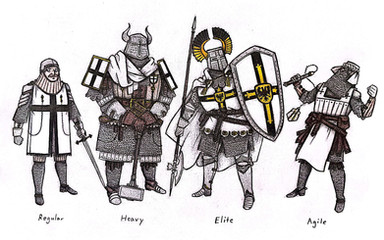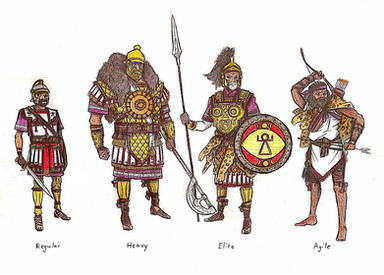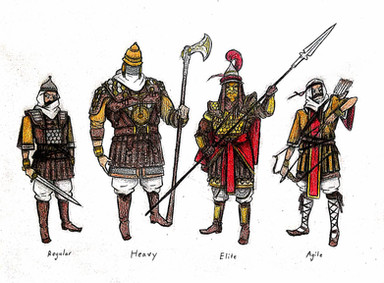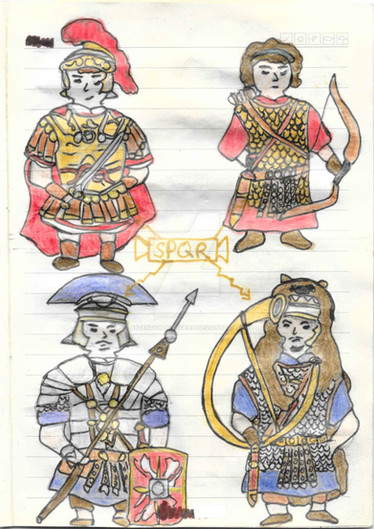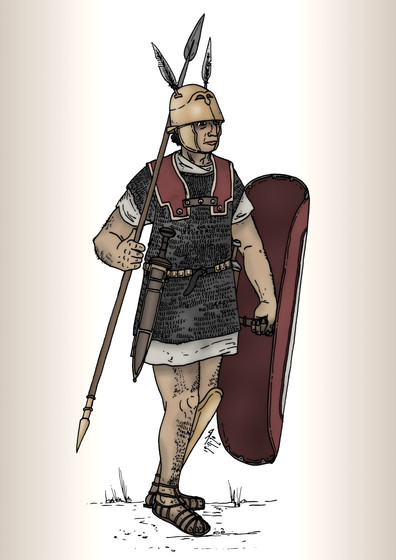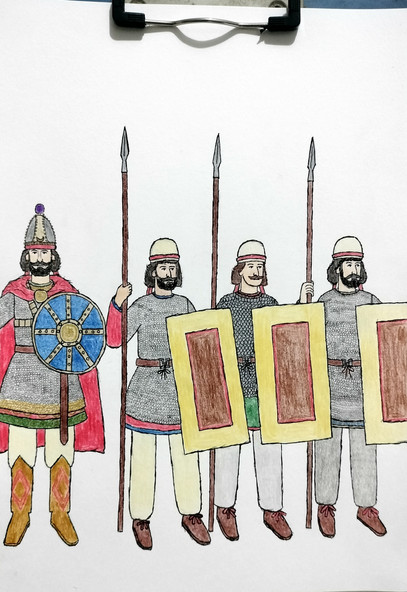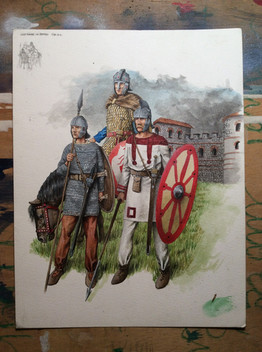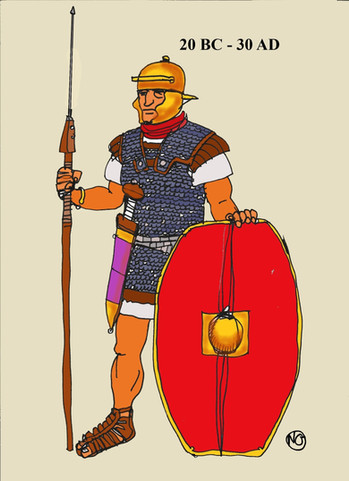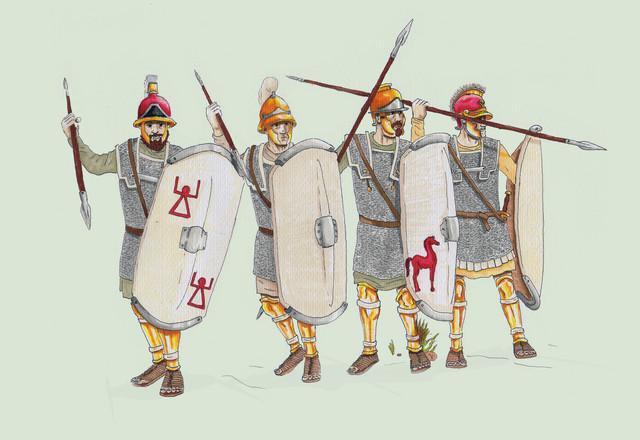HOME | DD
 Avapithecus — Roman Legionaries
Avapithecus — Roman Legionaries

#army #character #design #history #legion #legionnaires #military #referencesheet #roman #rome #soldiers
Published: 2023-07-19 12:23:34 +0000 UTC; Views: 15403; Favourites: 204; Downloads: 0
Redirect to original
Description
Ah Rome, where all roads lead to. To this day, Rome is considered the penultimate civilization in the eyes of Western Culture, which has, for better or worse, been at its own throat as every modern state scrambles to claim the laurel of this long dead empire. So brace yourselves, this is another long one, and an extremely simplified one. Roman history spans well over a thousand years (over two thousand, really), so I'm gonna try to reserve specifics for when I draw figures from specific time periods. There's just too much to cover. Of course, Rome wasn't built in a day. Before it became the empire to end all empires (including itself if you think about it), Rome got its start as a podunk settlement along the Tiber River, indistinguishable from its Latin neighbors situated in the middle of the Italian Peninsula (with a healthy dose of cultural exchange from their Etruscan neighbors to the north, but that's a whole story for another time). Archaeology tells us that Rome's Seven Hills were continuously inhabited as early as 1000 BCE, with the earliest settlement being established as a bunch of straw huts on Palatine Hill. However, it's not until the 8th century BCE that this early settlement merged with the other major center on the Quirinal Hill and took off as a major influence in the region. Interestingly, these dates do roughly correspond to the traditional timeline the Romans passed down for their mythical founding, though it's impossible to say if any of the major characters, especially the older ones, actually existed in any capacity.The first myth actually has its origins in Greek legends about the founding of Rome, adopted and popularized by the Aeneid of the poet Virgil. The Romans loved themselves some Hellenization. This telling begins with the Trojan War, and follows the story of a Trojan hero named Aeneas, son of the goddess Venus. After the Achaeans burnt Troy to the ground, Aeneas thinks to himself, hmm, I should get the hell outta here, and packs up to set sail for Italy. The goddess Juno, however, is shitty over a prophecy that foretells that Aeneas's descendants will destroy Carthage, which is apparently her favorite city for… some reason. She derails their fleet with a massive storm, forcing Aeneas to, ironically, land in Carthage itself, where he meets their founding queen Dido. Don't… think too hard about how Dido would've lived nearly 400 years after the Trojan War. Clearly Virgil didn't either. In this telling, Dido gets the hots for Aeneas, but is distraught over her loyalty to her deceased husband. This is actually awesome for Juno, goddess of marriage, who convinces Venus to really turn up the dial on these two's hormones to distract Aeneas from his destiny. Unfortunately for her, Aeneas gets thoroughly Revengeance Status-ed by Mercury, and decides that the only way to successfully make it through No-Nut November is to bounce out of that joint. Dido, understandably, is pretty pissed off, so much so that she burns herself alive and swears that Rome and Carthage would be eternal enemies from here on out. Foreshadowing, wink wink nudge nudge.
Aeneas and his crew thus get the hell out of dodge, and after a long series of misadventures which aren't all that important to go into, eventually settle in Latium, founding the city of Alba Longa. From Aeneas's lineage, two twin boys are eventually born here in the 8th century BCE: Romulus and Remus. Born the sons of Rhea Silvia and the god Mars, the twins' mere existence was a bad omen for the king of Alba Longa, who thus had them… taken care of, mwahahaha. Instead of being left to die, though, a she-wolf stumbled across this perfectly delectable meal and decided that actually, I'm gonna suckle these boys as my pups instead. Eventually the boys are found by a human couple and taken in, allowing them to grow up to overthrow the king who threw them out, as always happens in these stories. At last we come to the traditional date of 753 BCE, when Romulus and Remus set out to found a city of their own among the Seven Hills of the Tiber. They couldn't agree on where exactly to put the damn thing, though, and even when they tried to consult the gods through augury, neither could agree on what the signs meant. It's then that Romulus came up with an incredible solution to their indecision: just kill his brother! Now no one could bitch to him about the placement of the city, which he so humbly named "Rome" after himself. I guess "Reme" would be a stupid name anyways.
Romulus ruled as king of Rome until his death in 716 BCE. The Senate, an institution founded by Romulus as basically an advisory of 100 old men, selected Numa Pompilius to be his successor. Numa Pompilius is generally remembered as a stand up dude who established much of Rome's first religious infrastructure, including the office of Pontifex Maximus (basically High Priest). He died in 673 BCE, and was succeeded by Tullus Hostillus, who was, as you can probably guess, a pretty hostile asshole. He conquered Alba Longa, and proceeded to slack so hard on the religious rites that Jupiter struck his ass down with a lightning bolt in 642 BCE. After an interregnum, he was succeeded by Numa's grandson, Ancus Marcius, who conquered large swathes of Latinum and granted their peoples Roman citizenship. He died in 616 BCE, and was succeeded by Lucius Tarquinius Priscus. He mostly kept his nose clean and focused on relations with the Etruscans from whom he descended. When he was assassinated in 579 BCE, Serving Tullius became king, only for himself to be assassinated in 535 BCE by agents of Lucius Tarquinius Superbus.
This Tarquinius was the son of the previous Tarquinius, and he was a right tyrannical asshole pretty much from the moment he sat in the throne. His son, Sextus Tarquinius, forced himself on a noblewoman named Lucretia, and that was the final straw for the Roman people. In 509 BCE, a resistance force, which included one Lucius Junius Brutus, rose up and overthrew the monarchy in its entirety. Power was now squarely in the hands of the Senate, issuing in the dawn of the Republic, and now I have to explain the Roman Senate, gods help me. Okay so generally speaking, the Senate was an assembly of about 300 or so old geezers who started their career at a minimum age of 30. The very word "Senate" derives from Latin "senex" meaning "old", and is also the root of our English "senial". Insert your own joke here. In theory, their advanced age would grant them wisdom to pass down to the incoming younger generation of Senators. In practice, the Senate was rife with corruption and designed to give those who already had power as many opportunities as possible to maintain it. Insert your own commentary here. Senators were elected by Public Assembly (mostly made up of the rich aristocrats of Roman society) in an egregiously complicated set up that would make our modern Electoral College blush. Basically, each class of Roman society was arranged in voting blocks which had the goal of getting a candidate to a certain percentage of votes before the others. The rich, of course, got the most seats and the privilege of voting first, making it very easy to overwhelm the tally before the poor ever even get the chance to speak. Gee willikers wouldn't it sure be swell if one vote per citizen just counted as one vote per citizen instead of deferring the decision to some faceless rich guys hand picking their candidates without consulting the actual will of the people? I mean that sure does sound like it sucks ass doesn't it? Haha ha ha… hauuuuuuggggh this is the third time talking about events 2000 years ago has led me to this same joke and I'm not comfortable with that.
The Senate was presided over by two consuls, who could call assembly, establish the agenda of the day, veto one another, and had command over the Roman army. As consuls could only hold office for one year, it put pressure on these individuals to pump all their energy into winning as much personal glory as possible before they were cycled out of power. This was the dynamic that dominated the Roman Republic's government during their first major excursion outside of Italy: the Punic Wars of the 3rd century BCE. While the curse of Dido is likely entirely made up, there was one man who did swear an oath to never be a friend to Rome: the Carthaginian general Hannibal. Spurned on by the actions of his father, who suffered humiliation during the first Punic War, Hannibal would pull off one of the most badass moves in history when he crossed the Alps with a hoard of war elephants in 218 BCE. His gravest mistake though was not marching on Rome itself when it was within his grasp. The Romans used this opportunity to turn the tables on Carthage, even burning the city itself to the ground in 146 BCE. The absorption of Carthaginian territory was Rome's first real step into empire, and before the century was out, they'd have all of Greece under their control as well, having played the city states off one another during the Macedonian Wars before moving in to take them all as their own.
By the 1st century BCE, Rome began to get its fingers in the affairs of Jerusalem and Egypt, which is really where the Republic began to crumble. Honestly, given how rotten and corrupt Roman politics were, I'm surprised it took this long for it to fall. Enter Julius Caesar, an aspiring veteran of the wars against Gaul who totally definitely pinky promise didn't have any aspirations of becoming king of Rome. Just dictator for life. Very different. As this bullshit stank so bad that anyone with a nose could smell it all the way from his private chambers with Cleopatra in Alexandria, it fell to the Roman Senate to do something to curb his enthusiasm. Namely, stabbing him 23 times on the floor of the Senate. Reportedly, when Caesar saw his adopted son Marcus Junius Brutus (descendant of the previously mentioned Brutus) was one of the conspirators, he simply pulled his toga over his head, curled up in a ball, and consigned himself to his fate. Unfortunately, this didn't really have the liberating effect the Senators were hoping for. All it did was give Caesar's grandnephew Octavian an excuse to execute Order 66 on everyone involved in the murder. He also took the precaution of eliminating his rivals Cleopatra and Mark Antony in 30 BCE, leaving him with practically no opposition when he ended the Republic and assumed the title of Emperor in 27 BCE.
Well okay, technically he had a variety of different titles which all combined into what we would now dub "Emperor". The word "emperor" itself derives from Latin "imperator", basically meaning "commander" as in commander of the army. The army which permitted you to be Emperor. If the army didn't like you, then you weren't gonna be Emperor anymore. Or alive, for that matter. Roman Emperor has got to have one of the shortest life expectancies of any occupation. The Crisis of the Third Century saw 26 claimants to the imperial throne get axed by conspirators between 235 and 284 alone. That's about an average of a new Emperor getting installed every 1.9 years until Aurelian put the kibosh on that. That wasn't the only problem, though. As the centuries wore on, the Romans would have to deal with the consequences of killing some hippie carpenter from Nazareth all the way back in 30 CE. Christianity was originally an underground religion confined to hushed tones, but as the rich do, they eventually picked up this underground movement because they thought it made them all naughty and they had nothing better to do with all their money. Over time, this became a very real political force which led the Emperor Diocletian to institute a mass persecution of Christians within the Empire. Christianity would survive, however, and go on to influence the entire course of Roman history, short lived as it may be… but we'll touch on that in tomorrow's blurb. I want to go to bed.
Design notes, this one was relatively straight forward. Not only are Roman military uniforms widely documented, but the Romans were also the first to really standardize their military equipment. It's fairly easy to find all manner of consistent references for everything from legionnaires to centurions. Hell, I took Latin in high school and my teacher had a mannequin dressed in a full suit of lorica segmentata, which he would don for presentations because Mr. Perkins was awesome. He also had a gladius and a pilum which he once allowed us to hold. Stupidly, he allowed the pilum to enter my clumsy hands, and I nearly took my friend's head off when I spun around to look at someone who called my name. Don't give me pointy things. Anyways, the only one I really took the most artistic liberties on was the heavy. I sort of combined the get up of an aquilifer (standard-bearer) with the armor of a gladiator. Initially I was kind of against using gladiators as a reference, since gladiator combat was staged and embellished to such a degree that it really shouldn't reflect Roman military customs, but I can't deny they lend themselves well to that hulking barbarian look I wanted to fulfill. That's barbarian in the modern sense, not the Roman sense. I think I'd have my scrawny ass beat in the street if I called a Roman a barbarian from their perspective.
Related content
Comments: 12

👍: 1 ⏩: 1

👍: 0 ⏩: 0

👍: 1 ⏩: 1

👍: 1 ⏩: 1

👍: 1 ⏩: 1

👍: 1 ⏩: 0

👍: 1 ⏩: 1

👍: 1 ⏩: 0

👍: 1 ⏩: 1

👍: 1 ⏩: 2

👍: 0 ⏩: 0

👍: 0 ⏩: 0

